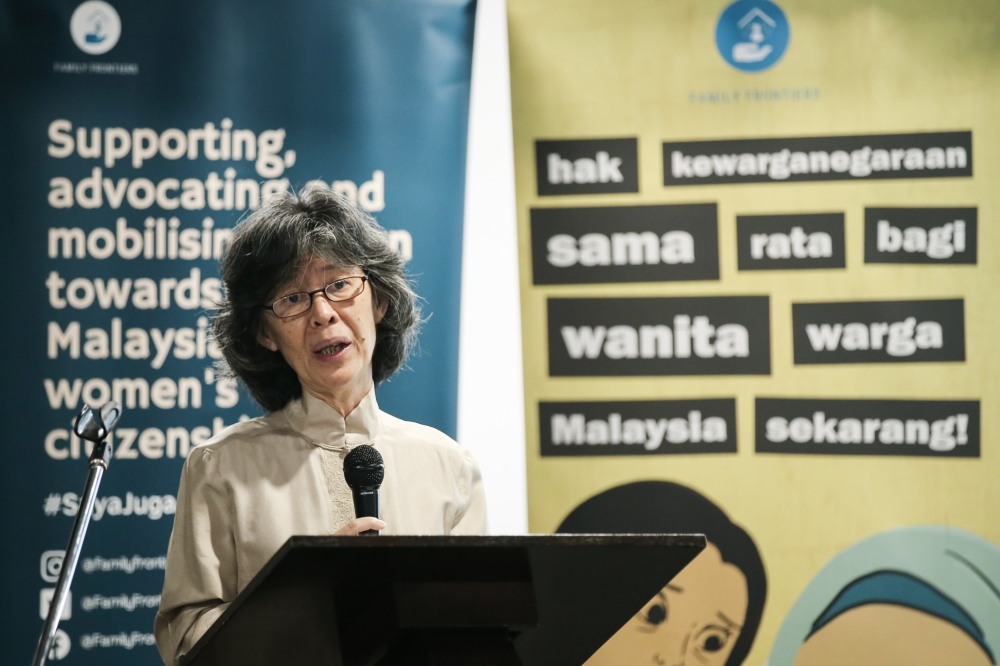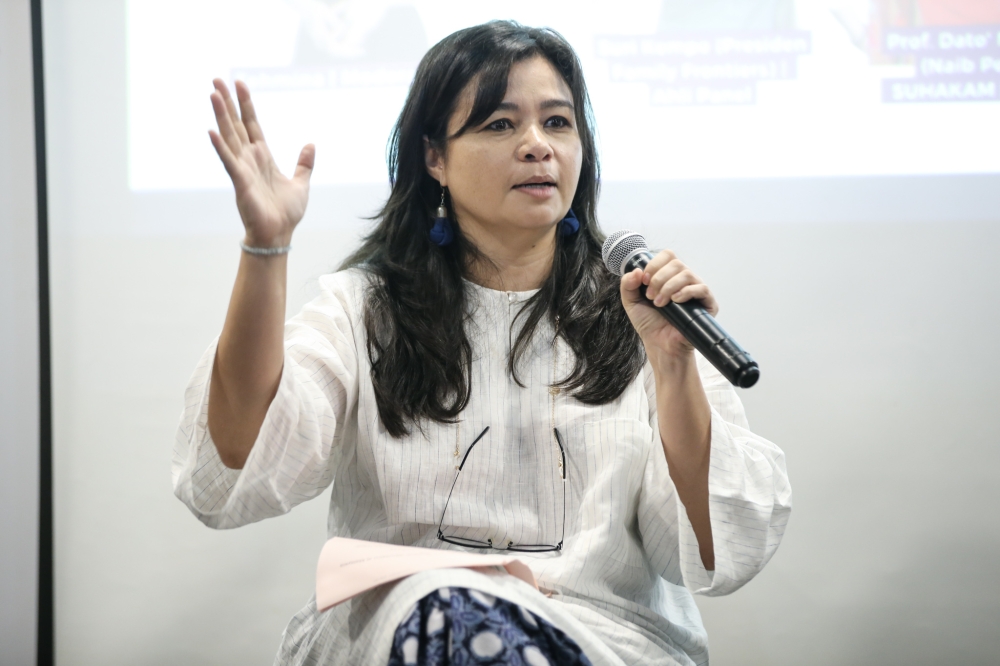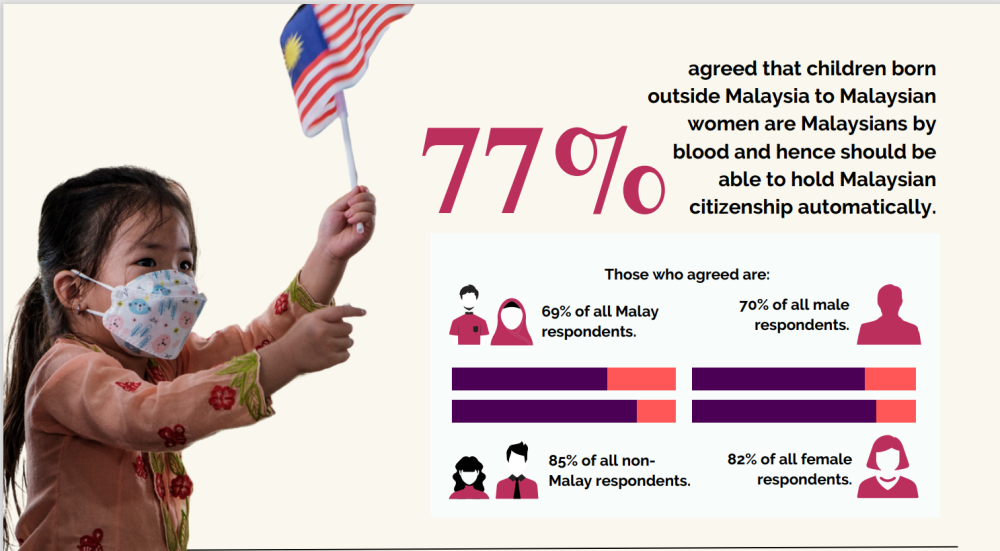KUALA LUMPUR, May 17 — A whopping 82 per cent of Malaysians in a survey agree that Malaysia should change its laws to enable Malaysian mother’s overseas-born children to automatically be Malaysians, with such firm support being given irrespective of their ethnicity and gender.
In an online survey conducted nationwide, a total of 808 Malaysians of voting age were asked for their views on whether Malaysian mothers and their children born abroad should be given equal citizenship rights as those already enjoyed by Malaysian fathers.
“The survey results revealed that a significant majority of Malaysians, regardless of race and gender, believe that it is crucial to amend the existing citizenship law to grant Malaysian women equal rights to confer automatic citizenship on their overseas-born children,” the Association of Family Support & Welfare Selangor & KL, also known as Family Frontiers said in a statement here.
For example, on the question of whether Malaysia’s existing citizenship law needs to be amended to ensure Malaysian women have equal rights — the same as Malaysian men — to pass on automatic Malaysian citizenship to their children born abroad, 82 per cent of the 808 respondents agreed. This is the combined total of those who either agreed or strongly agreed.
Those who supported such law changes cut across race and gender, with 75 per cent of all Malay respondents agreeing and 89 per cent of all non-Malay respondents agreeing, while 77 per cent of male respondents and 86 per cent of female respondents agreed.
Out of the 808 respondents, 11 per cent were undecided, while the remaining eight per cent were those who either disagreed or strongly disagreed.
In his keynote speech at the event today, deputy minister in the Prime Minister’s Department in charge of law and institutional reform Ramkarpal Singh, confirmed that the necessary process to change the citizenship laws has begun and expressed confidence that these amendments to the Federal Constitution “are expected to be passed within this year”.
Ramkarpal also took note of the survey findings which revealed that a “staggering 82 per cent of Malaysians across diverse race and gender agreed that Malaysian women should be granted equal citizenship rights”.

Family Frontiers executive committee member Chee Yoke Ling said Malaysia’s Federal Constitution had its origins in an era where women were considered properties of men and where they would lose their legal identity upon marriage, adding that most countries which were formerly British colonies and the UK itself had already changed their laws to remove gender discrimination in their citizenship laws.
But Malaysia is now one of the few countries left in this world with such citizenship laws discriminating against Malaysian mothers, and Chee said it was time for changes to be carried out, due to the hardships and suffering caused to Malaysian mothers whose children are denied Malaysian citizenship because they were not born in Malaysia.
“And therefore, we want Article 14 that is discriminating against Malaysian mothers to be changed, because it is not just about legal issue, our children, the security and certainty of being a Malaysian citizen.
“It is that when you don’t have citizenship, you are in many circumstances and situations exposed to insecurities, lack of education access, lack of public health access, and if there is a problem in the marriage, the children and the mothers are also exposed to a lot of violence — physical violence, mental violence, emotional violence,” Chee said at the survey findings’ launch, adding that the lack of Malaysian citizenship for such children also caused much unnecessary suffering to such families amid border closures during the Covid-19 pandemic.
Busting myths about Malay support for law changes
At the event for the launch of the survey results, Family Frontiers president Suriani Kempe said the survey was carried out to bust myths and to counter a lot of misperception and disinformation about enabling automatic citizenship for Malaysian mothers’ overseas-born children.
When engaging with lawmakers, Family Frontiers had encountered remarks that touched on the “fear” that the ethnic Malay community oppose such automatic citizenship for Malaysian mothers’ overseas-born children, as well as worries by politicians that they would lose support from ethnic Malay voters, Suriani said.
"And one of those was that this issue is the Malays won't support [this], that there's opposition from Malays, so there's always this fear. So sometimes when we brought this issue up with politicians, they would say, later my constituency won't support, they will get upset with me if I support this issue.
"So that was frequently raised with us as a point of concern for wakil rakyat, so that's exactly why we launched the survey, because we wanted to do a little mythbusting," she said when describing the misperception that lawmakers had to overcome to support the legal change.
But Suriani said those who oppose online may not necessarily reflect what the public thinks but takes up all the airspace as they are the loudest, and said the survey instead showed that the majority of the public supported the legal changes and that it is not an issue divided across racial or religious lines.
“Because if you go to the average joe, they will say ‘I also don’t understand why women do not get equal rights for citizenship’. Malaysians, at the heart of it, are fair people. They don’t want to see their fellow citizens being in pain like this, being in suffering like this.
“At the end of the day, it’s really about using evidence-based information and data to feed the debate on this issue and not be fuelled by voices that divide us on race and religion,” she said.

In the same survey, 81 per cent of the 808 respondents said it was important to them for their MPs to support an amendment to the Federal Constitution to ensure that Malaysian women have equal citizenship rights as Malaysian men. In comparison, 12 per cent were undecided and only six per cent were in disagreement.
For those who want their MPs to support such law changes in Parliament, this was reflected in 75 per cent of all Malay respondents in this survey, 88 per cent of all non-Malay respondents, 78 per cent of all male respondents and 84 per cent of all female respondents.
In the survey, 77 per cent of the 808 respondents agreed that Malaysian women should be granted equal rights to automatically pass on their citizenship to their overseas-born children, while 13 per cent were undecided and 10 per cent disagreed.
Those who agreed were 67 per cent of all Malay respondents, 88 per cent of all non-Malay respondents, 72 per cent of male respondents and 82 per cent of female respondents.
Similarly, 77 per cent in the survey agreed Malaysian women's overseas-born children are Malaysians by blood and hence should be able to automatically hold Malaysian citizenship, with 14 per cent undecided and nine per cent disagreeing.
Those agreeing for automatic Malaysian citizenship for such children were 69 per cent of all Malay respondents, 85 per cent of all non-Malay respondents, 70 per cent of all male respondents and 82 per cent of all female respondents.

The survey was carried out by Family Frontiers through market research firm Vase.ai between November 16 to November 19, with questions asked in both English and Bahasa Malaysia.
The 808 respondents who took part in the survey were diverse ethnically, with 52.6 per cent being Malays, 32 per cent Chinese, nine per cent being non-Malay Bumiputera and six per cent being Indians or from other ethnic groups.
Of the 808 respondents, 45 per cent were male, 55 per cent were female; while they were spread out throughout Malaysia with 25 per cent from Peninsular Malaysia’s central region, 27 per cent from Sabah and Sarawak, and the rest in Peninsular Malaysia (northern region — 18 per cent, southern region — 15 per cent, east coast — 14 per cent).
Following the launch of the survey results, Family Frontiers launched its Twitter campaign where users could tag their MPs to urge them to vote in support of constitutional amendments to enable automatic citizenship for the overseas-born children of Malaysian mothers.
Family Frontiers also provided the link where Malaysians can find out how they can help Malaysian mothers to gain automatic citizenship recognition for their children born abroad.




















